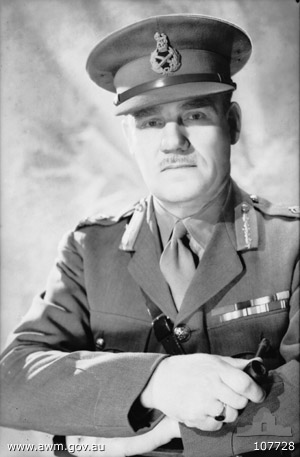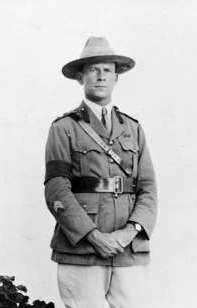|
Minister For National Emergency Services (New South Wales)
The Minister for National Emergency Services was a ministry in the government of New South Wales during World War II, with the two principal activities being a) the provision of measures for the protection of the life and property of the people, such as provision of air raid warnings, lighting control, air raid shelters, protection of vital plant and numerous other schemes to meet emergency conditions; and b) operational activities, including the organisation of personnel trained in specialist duties to cope with the immediate effects of enemy attack. While the agency was created in 1939 and Michael Bruxner, the Deputy Premier and Minister for Transport, was the first responsible minister, it was not created as a formal portfolio until the first McKell ministry in 1941. Role and responsibilities The National Emergency Services, New South Wales commenced operation on 1 February 1939. The agency was formed in response to a request from the Prime Minister that the Australian st ... [...More Info...] [...Related Items...] OR: [Wikipedia] [Google] [Baidu] |
Governor Of New South Wales
The governor of New South Wales is the viceregal representative of the Australian monarch, King Charles III, in the state of New South Wales. In an analogous way to the governor-general of Australia at the national level, the governors of the Australian states perform constitutional and ceremonial functions at the state level. The governor is appointed by the king on the advice of the premier of New South Wales, and serves in office for an unfixed period of time—known as serving ''At His Majesty's pleasure''—though five years is the general standard of office term. The current governor is retired jurist Margaret Beazley, who succeeded David Hurley on 2 May 2019. The office has its origin in the 18th-century colonial governors of New South Wales upon its settlement in 1788, and is the oldest continuous institution in Australia. The present incarnation of the position emerged with the Federation of Australia and the ''New South Wales Constitution Act 1902'', which defined t ... [...More Info...] [...Related Items...] OR: [Wikipedia] [Google] [Baidu] |
Stevens–Bruxner Ministry (1938–39)
The Stevens–Bruxner ministry (1938–1939) or Third Stevens–Bruxner ministry or Third Stevens ministry was the 48th ministry of the New South Wales Government, and was led by the 25th Premier, Bertram Stevens, in a United Australia Party coalition with the Country Party, that was led by Michael Bruxner. The ministry was the third of three occasions when the Government was led by Stevens, as Premier; and third of four occasions where Bruxner served as Deputy Premier. Stevens was first elected to the New South Wales Legislative Assembly in 1927 and served continuously until 1940. Having served as a senior minister in the Bavin ministry, following the defeat of the Nationalist coalition led by Bavin, who was in poor health, at the 1930 state election, Stevens was elected leader of the newly formed United Australia Party in New South Wales and became Leader of the Opposition. Bruxner was first elected to the Assembly in 1920 and served continuously until 1962. Initially a membe ... [...More Info...] [...Related Items...] OR: [Wikipedia] [Google] [Baidu] |
Air Raid FL19080748
The atmosphere of Earth is the layer of gases, known collectively as air, retained by Earth's gravity that surrounds the planet and forms its planetary atmosphere. The atmosphere of Earth protects life on Earth by creating pressure allowing for liquid water to exist on the Earth's surface, absorbing ultraviolet solar radiation, warming the surface through heat retention (greenhouse effect), and reducing temperature extremes between day and night (the diurnal temperature variation). By mole fraction (i.e., by number of molecules), dry air contains 78.08% nitrogen, 20.95% oxygen, 0.93% argon, 0.04% carbon dioxide, and small amounts of other gases. Air also contains a variable amount of water vapor, on average around 1% at sea level, and 0.4% over the entire atmosphere. Air composition, temperature, and atmospheric pressure vary with altitude. Within the atmosphere, air suitable for use in photosynthesis by terrestrial plants and breathing of terrestrial animals is found only in Ea ... [...More Info...] [...Related Items...] OR: [Wikipedia] [Google] [Baidu] |
McGirr Ministry (1947–1950)
The McGirr ministry (1947–1950) or Second McGirr ministry was the 53rd ministry of the New South Wales Government, and was led by the 28th Premier, Jim McGirr, of the Labor Party. The ministry was the second of three consecutive occasions when the Government was led by McGirr, as Premier. McGirr was first elected to the New South Wales Legislative Assembly in 1922 and served continuously until 1952, holding the various seats of Cootamundra, Cumberland, Bankstown, and Liverpool. Having served in the third ministry of Jack Lang, and the first and second ministries of William McKell, McGirr was variously torn between Lang Labor and the newly formed Australian Labor Party. When McKell stood aside as Premier in 1947 in order to take up an appointment as Governor-General of Australia, McGirr was elected Labor Leader and became Premier. McGirr led Labor to victory at the 1947 state election. This ministry covers the period from 19 May 1947 until the 1950 state election, held ... [...More Info...] [...Related Items...] OR: [Wikipedia] [Google] [Baidu] |
McGirr Ministry (1947)
The McGirr ministry (1947) or First McGirr ministry was the 52nd ministry of the New South Wales Government, and was led by the 28th Premier, Jim McGirr, of the Labor Party. The ministry was the first of three occasions when the Government was led by McGirr, as Premier. McGirr was first elected to the New South Wales Legislative Assembly in 1922 and served continuously until 1952, holding the various seats of Cootamundra, Cumberland, Bankstown, and Liverpool. McGirr was a staunch supporter of Jack Lang and served in the third Lang ministry, he was the only Langite to be appointed to William McKell's first ministry, retaining his portfolio in the second McKell ministry. When McKell stood aside as Premier in 1947 in order to take up an appointment as Governor-General of Australia, there was a bitter struggle for the Labor Leadership between McGirr and Bob Heffron, with McGirr eventually winning by just two votes. This ministry covers just 102 days, from 6 February 1947 ... [...More Info...] [...Related Items...] OR: [Wikipedia] [Google] [Baidu] |
McKell Ministry (1944–1947)
The McKell ministry (1944–1947) or Second McKell ministry was the 51st ministry of the New South Wales Government, and was led by the 27th Premier, William McKell, of the Labor Party. The ministry was the second of two occasions when the Government was led by McKell, as Premier. McKell was first elected to the New South Wales Legislative Assembly in 1917 and served continuously until 1947, when he resigned to become the 12th Governor-General of Australia. Having served as a junior minister in the first and third ministries of Jack Lang, during the 1930s McKell came to oppose Lang's dictatorial rule and critical of electoral failures. In 1939 McKell displaced Lang as Labor leader and NSW Leader of the Opposition. McKell led Labor to victory at the 1941 state election, defeating the United Australia Party / Country Party coalition of Alexander Mair and Michael Bruxner. McKell and his government were re-elected for a subsequent term at the 1944 state election. This minis ... [...More Info...] [...Related Items...] OR: [Wikipedia] [Google] [Baidu] |
The Northern Star
''The Northern Star'' is a daily newspaper serving Lismore, New South Wales, Australia. The newspaper is owned by News Corp Australia. ''The Northern Star'' is circulated to Lismore and surrounding communities, from Tweed Heads to the north, to Kyogle and Casino to the west and Evans Head to the south and includes the seaside towns of Byron Bay and Ballina. The circulation of ''The Northern Star'' is 14,737 Monday to Friday and 22,653 on Saturday. ''The Northern Star'' website is part of the APN Regional News Network. History The two-page first issue of ''The Northern Star'' was brought out on 13 May 1876, on the tiny Albion hand press that today holds pride of place in the foyer of the Goonellabah Media Centre. In 1955, building started on the media centre in Goonellabah, and in 1957, the move was made from the Molesworth St office. In 1981, ''The Northern Star'' commissioned a 7unit Goss Urbanite Web Offset press capable of printing 20,000 fifty-six page copies – 1.1 ... [...More Info...] [...Related Items...] OR: [Wikipedia] [Google] [Baidu] |
The Sydney Morning Herald
''The Sydney Morning Herald'' (''SMH'') is a daily compact newspaper published in Sydney, New South Wales, Australia, and owned by Nine. Founded in 1831 as the ''Sydney Herald'', the ''Herald'' is the oldest continuously published newspaper in Australia and "the most widely-read masthead in the country." The newspaper is published in compact print form from Monday to Saturday as ''The Sydney Morning Herald'' and on Sunday as its sister newspaper, '' The Sun-Herald'' and digitally as an online site and app, seven days a week. It is considered a newspaper of record for Australia. The print edition of ''The Sydney Morning Herald'' is available for purchase from many retail outlets throughout the Sydney metropolitan area, most parts of regional New South Wales, the Australian Capital Territory and South East Queensland. Overview ''The Sydney Morning Herald'' publishes a variety of supplements, including the magazines ''Good Weekend'' (included in the Saturday edition of ''Th ... [...More Info...] [...Related Items...] OR: [Wikipedia] [Google] [Baidu] |
Mair–Bruxner Ministry
The Mair–Bruxner ministry or Mair ministry was the 49th ministry of the New South Wales Government, and was led by the 26th Premier, Alexander Mair, in a United Australia Party coalition with the Country Party, that was led by Michael Bruxner. The ministry was the only occasion when the Government was led by Mair, as Premier; and fourth and final occasion where Bruxner served as Deputy Premier. Mair was first elected to the New South Wales Legislative Assembly in 1932 and served continuously until 1946. Having served as a junior minister in the third Stevens ministry and subsequently promoted, Stevens had resigned as Premier following the passing of a censure motion concerning Mair's proposal to cut government spending in order to restrain a growing deficit, with ten United Australia members crossing the floor to vote against the government. Eric Spooner had ambitions to replace Stevens as leader however Bruxner refused to join a coalition with him and Mair won the leadershi ... [...More Info...] [...Related Items...] OR: [Wikipedia] [Google] [Baidu] |
Lieutenant Colonel
Lieutenant colonel ( , ) is a rank of commissioned officers in the armies, most marine forces and some air forces of the world, above a major and below a colonel. Several police forces in the United States use the rank of lieutenant colonel. The rank of lieutenant colonel is often shortened to simply "colonel" in conversation and in unofficial correspondence. Sometimes, the term 'half-colonel' is used in casual conversation in the British Army. In the United States Air Force, the term 'light bird' or 'light bird colonel' (as opposed to a 'full bird colonel') is an acceptable casual reference to the rank but is never used directly towards the rank holder. A lieutenant colonel is typically in charge of a battalion or regiment in the army. The following articles deal with the rank of lieutenant colonel: * Lieutenant-colonel (Canada) * Lieutenant colonel (Eastern Europe) * Lieutenant colonel (Turkey) * Lieutenant colonel (Sri Lanka) * Lieutenant colonel (United Kingdom) * L ... [...More Info...] [...Related Items...] OR: [Wikipedia] [Google] [Baidu] |
Michael Bruxner
Lieutenant Colonel Sir Michael Frederick Bruxner (25 March 1882 – 28 March 1970) was an Australian politician and soldier, serving for many years as leader of the Country Party (and its predecessors) in New South Wales. Born in the north of the state, Bruxner was educated at The Armidale School and started studies at University of Sydney but later dropped out to take up employment as a grazier and station agent in Tenterfield. After serving in the Citizen Military Forces from 1911, Bruxner enlisted into the Australian Light Horse upon the outbreak of the First World War in 1914. Serving with distinction in Gallipoli, Egypt and Palestine, he was promoted to lieutenant colonel and awarded the Distinguished Service Order. Returning to Australia in 1919, Bruxner sold his business and joined the Progressive Party, being elected to the Parliament of New South Wales for Northern Tablelands at the 1920 election. Bruxner came to political prominence when he led the rural "True Blue ... [...More Info...] [...Related Items...] OR: [Wikipedia] [Google] [Baidu] |
World War I
World War I (28 July 1914 11 November 1918), often abbreviated as WWI, was one of the deadliest global conflicts in history. Belligerents included much of Europe, the Russian Empire, the United States, and the Ottoman Empire, with fighting occurring throughout Europe, the Middle East, Africa, the Pacific, and parts of Asia. An estimated 9 million soldiers were killed in combat, plus another 23 million wounded, while 5 million civilians died as a result of military action, hunger, and disease. Millions more died in genocides within the Ottoman Empire and in the 1918 influenza pandemic, which was exacerbated by the movement of combatants during the war. Prior to 1914, the European great powers were divided between the Triple Entente (comprising France, Russia, and Britain) and the Triple Alliance (containing Germany, Austria-Hungary, and Italy). Tensions in the Balkans came to a head on 28 June 1914, following the assassination of Archduke Franz Ferdin ... [...More Info...] [...Related Items...] OR: [Wikipedia] [Google] [Baidu] |




